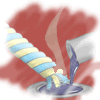Holiday havdalah can be divided into two categories.
Havdalah is made when entering a day of lesser holiness. Since Shabbat is holier than all the holidays, we recite the havdalah when Shabbat leads into a holiday. Following the same logic, havdalah is not recited if a holiday leads into Shabbat.
Havdalah at the Conclusion of a Holiday
Havdalah is only made when entering a day of lesser holinessHavdalah is recited at the conclusion of the following biblical holidays: Rosh Hashanah; Yom Kippur; the first days of Sukkot; Simchat Torah; Passover, both its first and last days; and Shavuot.
If the final day of the holiday was Shabbat, then the exact same havdalah procedure as a typical Saturday night is followed. If the holiday ended on another weeknight, the procedure is very similar to the Shabbat havdalah, but with some differences:
- In some communities, the prefatory verses (from "Hinei E-l" until the wine blessing) are omitted. Many communities, however, including Chabad, do recite these verses.
- Spices and a havdalah candle are not used. The exception to this rule is the Yom Kippur havdalah, which includes the blessing on a havdalah candle. The Yom Kippur havdalah candle is kindled from a fire which burnt throughout the holiday, such as a yahrtzeit candle.
- The V'yiten lecha prayer is not recited following a holiday, nor is it customary to partake of a Melaveh Malka meal. (The Atah chonantanu insert is included in the post-holiday evening prayer.)
- If one forgets to make havdalah following a holiday, it can be recited until sundown of the following day.
Havdalah From Shabbat to a Holiday ("Yaknahaz")
Whether a holiday begins on a Saturday night or if Saturday night ushers in the second day of a holiday, that night's holiday kiddush incorporates within itself the havdalah for Shabbat as well.
The whole text of the kiddush/havdalah can be found in your standard or holiday prayer book. The following is the basic procedure:
- For the havdalah candle we use the standard holiday candles The order of the night's kiddush/havdalah is: 1) The wine blessing. 2) The holiday kiddush blessing. 3) The blessing on the candle. 4) The havdalah blessing — which is different than the standard Shabbat havdalah blessing. 5) The Shehecheyanu blessing (aside for the last days of Passover when it is not recited).
- No spices are used.
- For the havdalah candle we use the standard holiday candles which are on the table. It is not necessary to conjoin two candles. During this havdalah, many, including Chabad, have the custom to only gaze at the candles after reciting the candle blessing without looking at the fingernails.
Note: There are many activities which are forbidden on Shabbat but permissible on a holiday. All such activities must wait until one verbally "separates" between Shabbat and the holiday. This, however, does not have to wait for kiddush/havdalah, as a special havdalah themed insert, the Vatodi'enu paragraph, is inserted in the Amidah of the night's prayers. Alternatively, one can say: "Baruch hamavdil bayn kodesh likodesh" — "Blessed is the One who separates between (the) holiness (of Shabbat) and (the) holiness (of the holiday)."








Join the Discussion